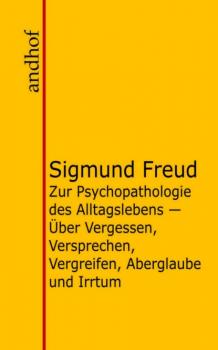ТОП просматриваемых книг сайта:















Зарубежная психология
Различные книги в жанре Зарубежная психология, доступные для чтения и скачиванияАннотация
En Relatos cortos que parecen historias la autora ha querido narrar sus vivencias, lo que los libros significan para ella, de esta forma, cuenta su trayectoria como maestra en los distintos colegios en los que ha trabajado y en los que se sintió plenamente realizada, así como los comentarios de sus buenos amigos y de sus hijos y nietos. Sus relatos narran de forma sencilla hechos que parecen historias. Todas son vivencias personales que hacen que el lector se sienta incluido en ellas.
Аннотация
Ein Großteil alltäglicher Fehlleistungen, wie das Versprechen, Vergessen, Verschreiben, Vergreifen, Verlegen von Gegenständen und anderen Fehlhandlungen und Irrtümern sind nach Freud Ausdruck unbewusster Absichten – nur auf den ersten Blick zufällige oder sinnlose Fehlleistungen bzw. Versehen, tatsächlich sind es aber sinnvolle Mechanismen des Unbewussten. Mit psychoanalytischer Methodik deckt Freud auch weniger offensichtliche psychische Motive von Fehlleistungen auf. Dabei kommt er bei der Analyse von Unfällen teilweise zu dem Ergebnis, es handle sich um unbewusst angestrebte Selbstbeschädigungen.
Das Buch Zur Psychopathologie des Alltagslebens gehört bis in die Gegenwart zu einem Grundlagenwerk der Psychoanalyse.
Das Buch Zur Psychopathologie des Alltagslebens gehört bis in die Gegenwart zu einem Grundlagenwerk der Psychoanalyse.
Аннотация
The Golden Bough is a wide-ranging, comparative study of mythology and religion, written by the Scottish anthropologist Sir James George Frazer. The book documents and details the similarities among magical and religious beliefs around the globe. Frazer attempted to define the shared elements of religious belief and scientific thought, discussing fertility rites, human sacrifice, the dying god, the scapegoat, and many other symbols and practices whose influences had extended into 20th-century culture. His thesis is that old religions were fertility cults that revolved around the worship and periodic sacrifice of a sacred king. Frazer proposed that mankind progresses from magic through religious belief to scientific thought. The influence of The Golden Bough on contemporary European literature and thought is substantial.
Аннотация
La autora plantea que somos «polvo de estrellas», venimos de la «energía creadora de amor» donde cada cual tiene posibilidad de elegir quien quiere ser el aquí y ahora. En esta perspectiva la autocreación no es sino el camino del conocimiento de uno mismo y de las posibilidades de liberación, destruyendo los sofismas, administrando los miedos y temores y liberándonos de las autolimitaciones de nuestro sistema de creencias.Solo de esta forma, como señala la autora, podemos llegar al «yo profundo», a la esencia, al interior de la morada de la perfección del Amor, la Belleza y la Armonía.
Аннотация
Avances en psicología del deporte es una obra escrita por profesionales de amplia trayectoria que proporciona información de forma clara, rigurosa y amena sobre las más recientes estrategias para influir sobre la conducta humana en el ámbito del deporte y el ejercicio. También presenta algunas aplicaciones quizás menos usuales pero con un gran potencial y recorrido de futuro. El libro es una obra de referencia para los profesionales de la psicología y una introducción completa para entrenadores y deportistas. En sus más de quince capítulos divididos en dos partes, cabe destacar: -Musicoterapia; -Psicología positiva ; -Risoterapia ; -Hipnosis; -Coaching; -Selección y scouting de deportistas; -Programación neurolingüística ; -Ciberspicología del deporte; -Aprendizaje experiencial en programas de aventura.
Информация о книге
Автор произведения Alejo García-Naveira Vaamonde
Аннотация
A Book of Myths is a collection of folk tales, legends and mythology from all over the world, assembled by Jean Lang. The book contains the myths of the North and of the South, legends of the East and of the West, with the study and analysis, as the author draws parallels between ancient myths and some modern beliefs. Table of Contents: Prometheus and Pandora Pygmalion Phaeton Endymion Orpheus Apollo and Daphne Psuche The calydonian Hunt Atalanta Arachine Idas and Marpessa Arethusa Perseus the Hero Niobe Hyacinthus King Midas of the Golden Touch Ceyx and Halycone Aristaeus the Bee-Keeper Proserpine Latona and the Rustics Echo and Narcissus Icarus Clytie The Cranes of Ibycus Syrinx The Death of Adonis Pan Lorelei Freya, Queen of the Northern Gods The Death of Baldur Beowulf Roland the Paladin The Children of Lir Deirdre
Аннотация
The Song of the Nibelungs, is an epic poem written around 1200 in Middle High German. Its anonymous poet was likely from the region of Passau. The Nibelungenlied is based on an oral tradition that has some of its origin in historic events and individuals of the 5th and 6th centuries. The poem is split into two parts: in the first part, Siegfried comes to Worms to acquire the hand of the Burgundian princess Kriemhild from her brother King Gunther. Gunther agrees to let Siegfried marry Kriemhild if Siegfried helps Gunther acquire the warrior-queen Brünhild as his wife. Siegfried does this and marries Kriemhild; however Brünhild and Kriemhild become rivals, leading eventually to Siegfried's murder by the Burgundian vassal Hagen with Gunther's involvement. In the second part, the widow Kriemhild is married to Etzel, king of the Huns. She later invites her brother and his court to visit Etzel's kingdom intending to kill Hagen. Her revenge results in the death of all the Burgundians who came to Etzel's court as well as the destruction of Etzel's kingdom and the death of Kriemhild herself. The Nibelungenlied was the first heroic epic put into writing in Germany, helping to found a larger genre of written heroic poetry.
Аннотация
Slavic Myths & Legends is a comprehensive study on myths, folklore and legends of the Slavic people settled in Eastern and Central Europe with a meticulous approach to the spirits and ghouls found in Slavic mythical beliefs. Thorough and comprehensive research covers various aspects of the theme, from stories of spirits of the dead, through folk tales of gods and beings of the households, forests and water, to legends of Slavic gods. The study comprehends the mythology of Slavic people of the Elbe river and the Russians, with a glance at the Baltic mythology.










